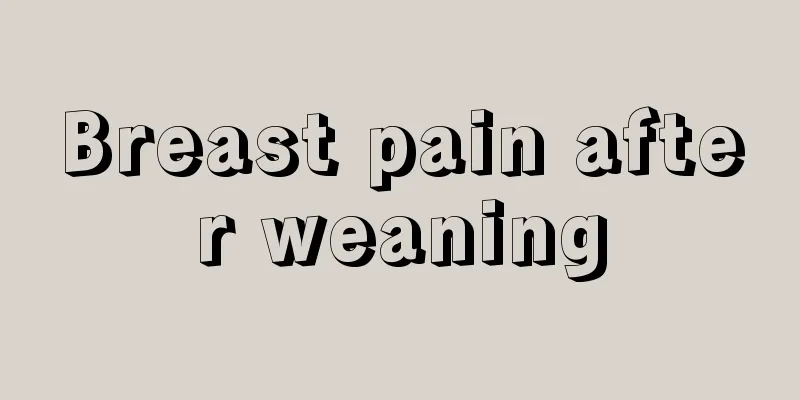Breast pain after weaning

|
Many women choose to breastfeed after giving birth, because breastfeeding is the best choice for babies. Mother's breast milk is the purest natural food without any additives, and the nutrition in breast milk can also meet the needs of the baby. However, the weaning period is also painful because the baby always cries. Some mothers also have tingling in their breasts after weaning. What's going on? 1. Express milk by hand or with the help of a breast pump Breast pain after weaning is mainly caused by milk congestion, so mothers can squeeze out the milk when their breasts are swollen, or use a breast pump to suck out the congested milk until the breasts become soft. Be careful not to empty it, as emptying it can easily stimulate the mammary glands and increase milk secretion. 2. Cold compress Mothers who experience severe swelling and pain can apply cabbage or potato slices on their breasts, or put Glauber's salt (about 100 grams) in a cloth bag and apply it on the breasts, followed by gentle massage. The bag needs to be replaced in time after it has deliquesced, 3-4 times a day. Cold compress can have a certain analgesic effect, but remember to squeeze out the milk before doing so. 3. Reduce the intake of nutritious soups Many nutritious soups can promote lactation. Mothers should pay attention to drinking less nutritious soups when weaning to avoid more milk accumulation. Try to eat more light foods. 5. Seek help from a lactation consultant Lactation consultants are professionally trained and mainly use acupoint massage to dredge the meridians. If the mother is really uncomfortable with the bloating and pain, she can also ask the lactation consultant for help. 1. If your breasts are swollen and uncomfortable, you can squeeze out the milk, but don't squeeze it out completely, otherwise it will promote milk secretion and have the opposite effect. 2. During the weaning period, you should pay attention to reducing stimulation to the breasts and nipples. The secretion of prolactin will decrease accordingly, and the secretion of milk will gradually decrease. Never let your baby suck your breast milk or touch it, and avoid using hot water to rinse your breasts when taking a shower. 3. You can use ice packs to cool your breasts to relieve the feeling of swelling. 4. If you find a lump in your breast, rub it with your hands in time to prevent mastitis. 5. When choosing diet during weaning, you should avoid foods that promote milk secretion, such as peanuts, pig's trotters, crucian carp, soups, etc., and eat less protein-rich foods, which can reduce milk secretion. During the weaning period, you should also pay attention to reducing the water intake in your diet. 6. Try to avoid using hormone drugs or milk-suppressing injections, as they can easily cause breast atrophy or breast secretion problems. |
<<: Nipple soreness after ovulation
>>: 38 weeks pregnant lower abdominal pain
Recommend
Why is the vaginal discharge a little green?
Women's secretions are generally milky white ...
Is scanty menstruation really an endocrine disorder?
Normal women have a menstrual cycle every month, ...
If you don’t “grow” the bacteria in your mouth properly, it will affect more than just your oral health
As the saying goes, "Diseases come from the ...
What should I do if I have sex right after a miscarriage?
If a woman fails to conceive in the early stages ...
My girlfriend has a stomachache during her period, what should I do?
Many women will experience abdominal pain during ...
Summer is over, why are mosquitoes still flying around?
The hot summer is gone The weather is getting coo...
What should I do if there is blood in the leucorrhea after medical abortion?
Many women choose medical abortion, perhaps becau...
Causes of gynecological inflammation
Gynecological inflammation has caused a lot of ha...
How should high-risk cervical virus be treated?
Women should pay attention to protecting their ce...
What happens if menstruation comes more than ten days?
Menstruation is the most unique physiological pro...
The Secret of the World Behind the Screen: Defeat the "Mysterious Man" and Protect Your Online Privacy
Source: Ni Xiaojiang & Jing'an CDC...
How to unclog a blocked nipple
If the nipple is blocked, the baby will be very a...
What are the signs of pregnancy?
In the early stages of pregnancy, many people do ...
What skin care products are better for men?
Nowadays, skin care is no longer just a female pr...
What is the cause of coffee-colored leucorrhea?
The health of a woman's body can be analyzed ...









